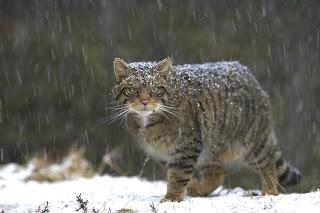 Cat owners across Scotland are being asked to help protect a highly endangered native species, the Scottish wildcat. Experts estimate there are fewer than 300 wildcats left in the wild but Scottish Wildcat Action hopes that pet and farm cats will help save the day by becoming “Supercats.”Scottish Wildcat Action is a national project supported by the Heritage Lottery Fund, which aims to halt the decline of this native species by 2020. It is led by Scottish Natural Heritage (SNH) and is a partnership of 20 organisations. The Supercat campaign will launch on World Spay Day on 28 February with support from wildlife filmmaker, Gordon Buchanan, and using the hashtag #supercat.To become a Supercat, a domestic cat needs to be micro-chipped, neutered and have up-to-date vaccinations. This helps wildcats by reducing the risks of cross-breeding and disease that are wiping out the last few wildcats in Scotland. Vaccinations, in particular, also help give Supercats themselves better protection from a range of threats.
Cat owners across Scotland are being asked to help protect a highly endangered native species, the Scottish wildcat. Experts estimate there are fewer than 300 wildcats left in the wild but Scottish Wildcat Action hopes that pet and farm cats will help save the day by becoming “Supercats.”Scottish Wildcat Action is a national project supported by the Heritage Lottery Fund, which aims to halt the decline of this native species by 2020. It is led by Scottish Natural Heritage (SNH) and is a partnership of 20 organisations. The Supercat campaign will launch on World Spay Day on 28 February with support from wildlife filmmaker, Gordon Buchanan, and using the hashtag #supercat.To become a Supercat, a domestic cat needs to be micro-chipped, neutered and have up-to-date vaccinations. This helps wildcats by reducing the risks of cross-breeding and disease that are wiping out the last few wildcats in Scotland. Vaccinations, in particular, also help give Supercats themselves better protection from a range of threats. Gordon Buchanan said:“Scottish wildcats are stunning creatures and an important part of our natural heritage. I would encourage all cat owners to help protect this native species by getting their pet or farm cat vaccinated, neutered and micro-chipped.”Dr Roo Campbell from SNH, who is the Priority Areas Manager for Scottish Wildcat Action, added:“If all domestic cats were Supercats, it would give wildcats the best chance of survival. We know a few wildcats are still out there, but they face serious threats. To increase their numbers, it’s really important that they have more wildcat kittens and not the hybrid kittens born from mating with domestic cats.”The benefits associated with becoming a Supercat include better protection from disease (including those transmitted through mating), lower risk of injuries sustained in fights, less inclination to roam long distances and so lower risk of road traffic accidents, and increased likelihood of being found if lost.Research at the University of Edinburgh’s Royal (Dick) School of Veterinary Studies confirms that wildcats can contract the same diseases as our domestic cats.Professor Anna Meredith, Personal Chair of Zoological and Conservation Medicine at The Royal (Dick) School of Veterinary Studies, explains:“Diseases that are a threat to both domestic cats and wildcats include Feline Leukaemia (FeLV) and Feline Aids (FIV). The best way to provide protection from these fatal diseases and other threats is to both neuter and vaccinate domestic cats.”Vets in Scotland are also joining the campaign and recommending cat owners to micro-chip, neuter and vaccinate.“We would recommend getting your kitten neutered from four months of age. Cats will mate with even their own brothers or sisters, so it’s important to neuter before they become sexually mature,” said Dingwall vet, Alice Bacon.“Cats also need to get their jags regularly to protect them from disease and should be micro-chipped. Inserting a small micro-chip under your pet cat’s skin helps to identify it if it gets lost or stolen, which prevents cats from becoming strays. If we all pull together, we can save a very special cat from the edge of extinction and there are benefits all round.”To find out more about how your cat can become a Supercat, visit www.scottishwildcataction.org/supercat or join in the #supercat movement on Facebook or Twitter @SaveOurWildcats. This work to conserve Scottish wildcats is one of the many projects being implemented by SNH and other partners to meet the 2020 Challenge for Scotland’s Biodiversity.
Gordon Buchanan said:“Scottish wildcats are stunning creatures and an important part of our natural heritage. I would encourage all cat owners to help protect this native species by getting their pet or farm cat vaccinated, neutered and micro-chipped.”Dr Roo Campbell from SNH, who is the Priority Areas Manager for Scottish Wildcat Action, added:“If all domestic cats were Supercats, it would give wildcats the best chance of survival. We know a few wildcats are still out there, but they face serious threats. To increase their numbers, it’s really important that they have more wildcat kittens and not the hybrid kittens born from mating with domestic cats.”The benefits associated with becoming a Supercat include better protection from disease (including those transmitted through mating), lower risk of injuries sustained in fights, less inclination to roam long distances and so lower risk of road traffic accidents, and increased likelihood of being found if lost.Research at the University of Edinburgh’s Royal (Dick) School of Veterinary Studies confirms that wildcats can contract the same diseases as our domestic cats.Professor Anna Meredith, Personal Chair of Zoological and Conservation Medicine at The Royal (Dick) School of Veterinary Studies, explains:“Diseases that are a threat to both domestic cats and wildcats include Feline Leukaemia (FeLV) and Feline Aids (FIV). The best way to provide protection from these fatal diseases and other threats is to both neuter and vaccinate domestic cats.”Vets in Scotland are also joining the campaign and recommending cat owners to micro-chip, neuter and vaccinate.“We would recommend getting your kitten neutered from four months of age. Cats will mate with even their own brothers or sisters, so it’s important to neuter before they become sexually mature,” said Dingwall vet, Alice Bacon.“Cats also need to get their jags regularly to protect them from disease and should be micro-chipped. Inserting a small micro-chip under your pet cat’s skin helps to identify it if it gets lost or stolen, which prevents cats from becoming strays. If we all pull together, we can save a very special cat from the edge of extinction and there are benefits all round.”To find out more about how your cat can become a Supercat, visit www.scottishwildcataction.org/supercat or join in the #supercat movement on Facebook or Twitter @SaveOurWildcats. This work to conserve Scottish wildcats is one of the many projects being implemented by SNH and other partners to meet the 2020 Challenge for Scotland’s Biodiversity.

